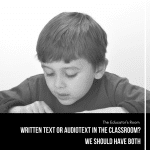Throughout my teaching career, I have used booktalks on a regular basis to motivate, inspire, and share quality literature with students. With middle school students, the booktalk can be an effective tool to hook reluctant readers and is an important component of independent reading time and/or a Reader’s Workshop. In short, a booktalk is a brief oral discussion about a book where the purpose is to “sell” the book to other readers. In developing a community of readers, both the teacher and students give booktalks.
What is a booktalk? It is a short, informal discussion about a book where the presenter highlights interesting parts to “sell” the book to other readers. These talks are casual in nature and act as a “book trailer”, much like a movie trailer. The speaker may read a passage or two from the book and shares the best parts in an attempt to grab the audience’s attention. The booktalk is not a summary of the book and usually the talk ends with a cliffhanger.
Why Use Booktalks in the Classroom? Booktalks are an interesting, engaging, and student-centered activity that promote independent reading with both the teacher and students sharing books they have enjoyed. Teachers can use the booktalk to feature quality young adult literature, classic literature, or books they know their students will enjoy. Students like hearing and watching their peers give a booktalk and are more willing to read a book that is suggested by a classmate.
How to Use Booktalks in the Classroom For me the beauty of booktalks is that they are flexible and the teacher can add as much structure as he/she wants or needs for his/her classroom. In my classroom, I always start by modeling many booktalks, provide explicit teaching on how to give a booktalk using a mini-lesson format, and then invite students to participate. By the end of the first marking period, many students have volunteered to give booktalks and at the start of the second marking period, I make it a class requirement. By establishing a risk-free atmosphere at the beginning, students are excited to share the books they are reading and this enthusiasm becomes contagious! My primary goal in using booktalks is to instill a love and enjoyment for reading, but it is also an effective informal reading assessment tool.
Tips for Implementing Booktalks in Your Classsroom
· The talk should be sincere, from the heart, and resemble a conversation. The talk should not be read from a script, although the reader may have notes that they consult. Moreover, the talk should reflect the teacher’s passion not only for the book but for reading itself. At the end, allow a few students to ask the reader questions to promote the conversational tone of the booktalk.
· Use a theme or select books that support the content being taught and learned in the classroom. Include a variety of books over the course of your booktalks, including nonfiction, poetry, and fiction.
· When I am working with students, I strive from the beginning to foster a community of learners where students trust me and where they are motivated by my passion for teaching, for learning, and for literacy. To achieve this in a booktalk, I like to select highly recommended contemporary and classic literature. Often, I consult the International Reading Association’s web site, specifically the “Choice Reading Lists” which include recommended lists from children and from teachers. In addition, I give interest surveys and a multiple intelligence assessment at the beginning of the school year. I use the results from these two tools to select books that would align with students’ interests. This is turn, also would allow me to select a variety of books and make my book selection more personal for my students.
· I remember a few years ago when I taught sixth grade English language arts. I was reading Island of the Blue Dolphins during our independent reading time. I absolutely loved, loved the book and gave a booktalk after several students asked me to since they were curious about the book. After the booktalk during a question and answer time, it became evident that many in the class were interested in dolphins. I capitalized on that by selecting a nonfiction book about dolphins for the next booktalk, thereby demonstrating to students that I really was listening to them and was sincerely interested in what they had to say.
· Read a short passage from the text that will hook the readers and make them want to read more.
· Keep the booktalks short- five to ten minutes- and reinforce that this is not a summary, but rather a time to share interesting parts without giving away too much. Never give away the ending, but rather conclude with a cliffhanger. Make the class want to read more!
· Use Google Calendar or a place a calendar on a bulletin board for students to schedule their booktalk. In my class, when students were finished a book, they wrote their name on the calendar on the days (usually Thursday and Fridays) when we had booktalks. By the second marking period, students were required to give one booktalk a marking period. By having 3-5 talks a week, it was relatively easy to manage.
· If you want to hold students accountable and assess, use a scoring rubric. There are many available for free, although I created my own.
· Make it creative! Bring in props that relate to the book’s characters or theme, show a movie clip if the book was made into a movie, give a dramatic reading, or dress in character!
· Invite guest readers into the classroom such as the librarian, a parent, the principal, or another teacher to give a booktalk.
By using booktalks, students are applying English language arts curricular standards such as public speaking, listening, synthesizing information, and demonstrating an understanding of a text, as well as habits of mind. Start out slowly, make it simple, and most importantly, have fun!
[/fusion_builder_column][/fusion_builder_row][/fusion_builder_container]





